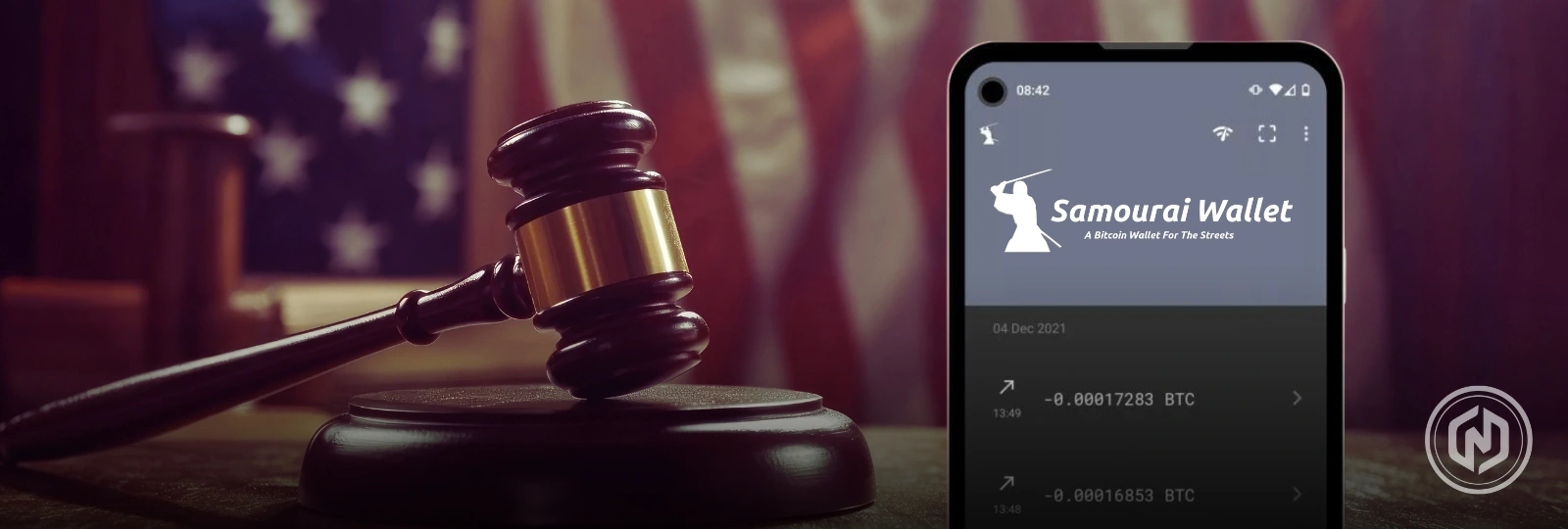Key Highlights
- U.S. Prosecutors are seeking the maximum five-year sentence for Samourai Wallet’s founders, who pleaded guilty to conspiring to operate an unlicensed money-transmitting business
- The government alleges Samourai processed over $2 billion in transactions by funneling more than $200 million in illicit funds from dark web markets and fraud schemes
- This case is similar to the prosecution of Tornado Cash developers
U.S. Federal Prosecutors are seeking the maximum 5-year prison sentence for the founders of Samourai Wallet, a popular cryptocurrency privacy tool.
Keonne Rodriguez and William Lonergan Hill pleaded guilty in July 2025 to conspiring to operate an unlicensed money-transmitting business. Their sentencing is scheduled for November 7, 2025.
Samourai Wallet’s Journey: From Privacy Pioneer to Controversy
Samourai Wallet launched in 2015 as a mobile application focused on enhancing the privacy of Bitcoin transactions. The service was non-custodial, meaning the company never held or controlled users’ funds.
“Between 2015 and April 2024, Rodriguez and Hill developed, marketed, controlled, and operated Samourai, a cryptocurrency mixing service that transferred Bitcoin (“BTC”) on behalf of the public in exchange for substantial fees. The purpose of the cryptocurrency mixing service was to make cryptocurrency untraceable, i.e., to conceal its source and owner by obfuscating transactions in BTC that would otherwise be publicly traceable through the blockchain,” stated in the court document.
Its key features, “Whirlpool” and “Ricochet,” were designed to obscure the trail of cryptocurrency payments by mixing coins from multiple users. The developers marketed these tools as essential for financial privacy in the digital age.
However, according to court documents, authorities saw a different purpose. Samourai Wallet processed over $2 billion in transactions. They claim that more than $200 million of the total was linked to illegal activities on dark web markets like Silk Road and Hydra, as well as various fraud schemes.
“From the start of the Whirlpool service in 2019 and the Ricochet service in 2017, at least 90,000 BTC (worth over $2.3 billion when applying the BTC-USD conversion rates at the time of each transaction) passed through these two services. Samourai collected fees for both services, totaling at least $5 million in BTC for Whirlpool transactions and at least $1.3 million in BTC for Ricochet transactions, valued at the time the transactions were conducted and the fees collected. Given the significant appreciation of Bitcoin, the approximately 246.3 BTC comprising the collective $6.3 million in fees is valued today at over $26.9 million,” the court document stated.
Internal messages and promotional tweets were cited as evidence that the founders were aware their service was being used by criminals.
Samourai’s Legal Battle
The legal end for Samourai Wallet began on April 24, when the FBI arrested Rodriguez in Pennsylvania. Hill was arrested in Portugal and later extradited to the United States. Authorities seized the service’s website and servers, taking it offline.
The founders were initially charged with both conspiracy to commit money laundering and operating an unlicensed money transmitter. They initially pleaded not guilty.
Their defense argued that, as a non-custodial software, Samourai Wallet did not fit the legal definition of a money transmitter. They also pointed out internal government discussions where the Financial Crimes Enforcement Network (FinCEN) had suggested that such software might not require licensing.
Despite these arguments, Rodriguez and Hill changed their pleas to guilty in July 2025. As part of their plea agreement, they admitted to designing Samourai to conceal illicit transactions and agreed to forfeit hundreds of millions of dollars.
Similarity Between Samourai and Tornador Cash
Samourai Wallet case has some similarities with another decentralized application, Tornado Cash, a crypto mixing platform. Tornado Cash was sanctioned by the Treasury Department in 2022, and its developers have also faced criminal charges. One co-founder was convicted in the Netherlands in 2024, while another was found guilty in a New York trial in July 2025.
The common thread in these cases is the government’s assertion that the creators of these privacy tools knew they were facilitating massive money laundering.
Both services were non-custodial and built on open-source code, leading to debates over whether developers can be held responsible for how others use their technology. Senators and industry groups have expressed concern that this legal approach could damage innovation and criminalize the act of writing privacy-focused code.


